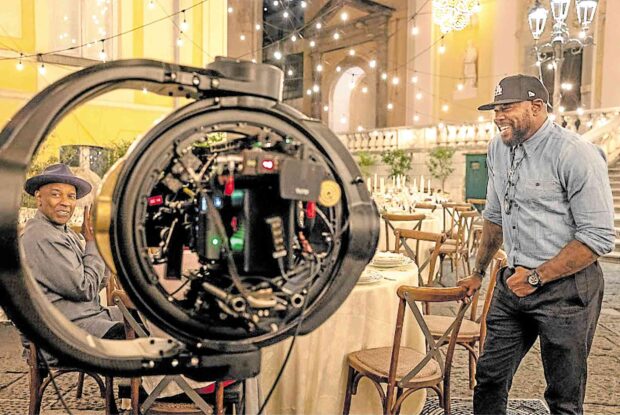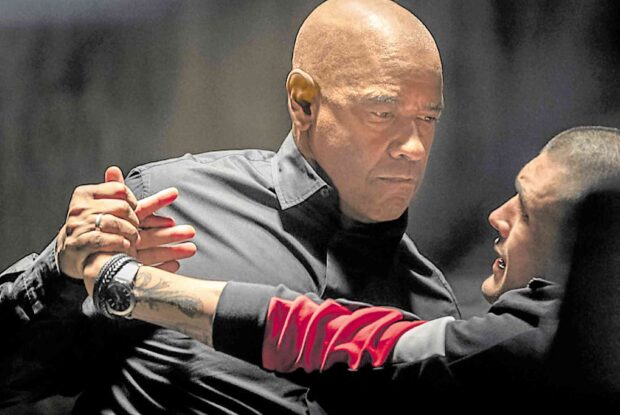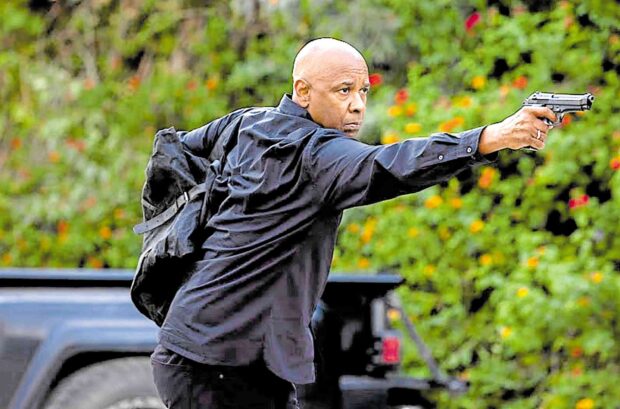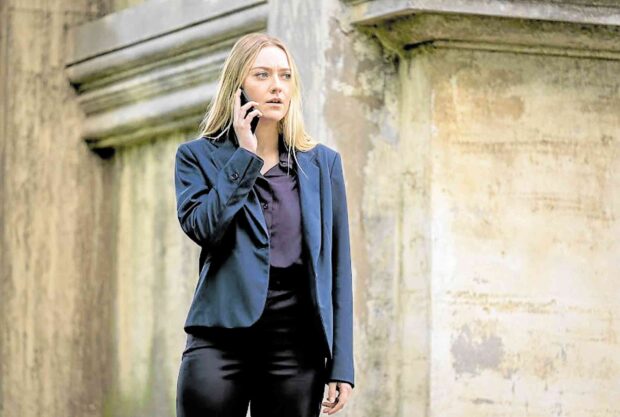Antoine Fuqua on ‘Equalizer’s’ intergenerational appeal: People want justice

Antoine Fuqua (right) with lead star Denzel Washington (Photo courtesy of Columbia Pictures)
In the third and final installment of “The Equalizer” film franchise, Denzel Washington reprises the role of former Marine and DIA operative Robert McCall, who finds himself in the throes of death after a deadly encounter with mobsters running a cyberheist operation in Sicily — and that’s just the start of the action-packed film! He soon finds himself standing up for a coastal Italian town’s beleaguered residents who are being terrorized by gangsters.
“The Equalizer 3,” which opens in Philippine theaters on Wednesday, has earned its highest approval rating so far (75 percent) on Rotten Tomatoes — with good reason: Despite its penchant for startling violence in the name of vigilante justice, the movie provides a heartwarming and wistful goodbye to a character who uses his time-honed skills to dispense justice and defend people who can’t protect themselves.
Prior to “The Equalizer” (2014) and “The Equalizer 2” (2018), Robert McCall’s crime-busting adventures began as a TV series in 1985, with six-time Emmy nominee Edward Woodward in the title role. Almost three decades later, McCall’s story has been revived as a big-screen action franchise for Denzel.
In a recent roundtable interview, we asked director Antoine Fuqua—who helmed not just the actor’s “The Equalizer” movies, but also 2016’s “The Magnificent Seven” and 2001’s “Training Day (for which Denzel won an Oscar)—what prompted him to reimagine the TV series as a star vehicle for his 68-year-old lead actor.

Scene from “The Equalizer 3”
Collaborative relationship
“Denzel actually called me about it,” he shared. “He doesn’t normally do that, but he told me about his take on it—and I understood what he was driving at. That’s how I got more excited about it. Once I started to think it through, I would call him and discuss our approach to the movie and this character. And I got him even more excited about it (laughs). But I think it’s our collaborative relationship that has really made this franchise work.”
Article continues after this advertisementAsked how he felt about finally ending the movie series, Antoine described filming Part 3 as “a great experience.” He explained, “I love the cinema, and I’m really going to miss seeing Robert McCall. And Denzel hasn’t been up on the big screen in a blockbuster-type film in a long time. His last one was the Shakespeare film he made in 2021 (Joel Coen’s film ‘The Tragedy of Macbeth,’ for which the actor was also nominated for best actor at the Oscars).
Article continues after this advertisement“Also, it’s nice to be able to put someone like Denzel Washington in a franchise because he isn’t just a great actor, he’s also a huge movie star. Moreover, it’s wonderful to see him having some fun playing Robert McCall again … and on location in Italy. We were very excited to do that.”

Denzel Washington as Robert McCall in “The Equalizer 3”
‘Staying true’
As all three “Equalizer” films demonstrate, McCall, the aging protagonist, is ultraviolent. He is the hypermasculine sort. But as the industry moves into an era of filmmaking beyond the age of social media, how does Antoine think men should be portrayed in action films?
“You just have to stay true to the material, whatever that is,” the director pointed out. “As you make the film, stay true to who you are as a filmmaker, especially in the way you understand the concept of what a man should be.
“And I’m still learning what that is because we’re all still evolving, pitfalls, dilemmas and all. But then again, what does ‘being a man’ really mean these day? The future is open for interpretation.”
Our Q&A with Antoine:
This story has remained popular with viewers from different generations for almost 40 years now. To which do you owe “The Equalizer’s” enduring intergenerational appeal?
More than money or fame, people want justice. And that’s what “The Equalizer” is all about.
You said that all people want in this world is justice — anybody can easily relate to that. The premise of the film also provides a measure of catharsis for a lot of viewers. But most of the stories in the franchise are very localized. Was there ever any attempt by the production to tackle larger themes, from criminal injustice to, say, institutionalized oppression?
Not at all. Not from me. I mean, “The Equalizer” is more about helping individuals with their issues, one person at a time—like, with Ralphie (Johnny Skourtis) in the first film. He was trying to help give the kid some confidence in himself, so it’s not just about beating someone up. Or the old man in “Equalizer 2.” It is really just about helping people anyway he can—it’s as simple as that.
What is it about Robert McCall that keeps drawing you back to him, and what kind of challenge did this present to you?
McCall is a complex character. He has a lot of ghosts from his past and some darkness in him that I wanted to explore a little more in this film. I wanted to see him come to terms with a moral dilemma from all the violence in his life.
Denzel and I talk a lot about how men like McCall eventually start to “enjoy” the violence more and more. Sometimes, you lose your way even when you’re trying to do it for all the right reasons. So, there’s that moral question of whether he’s a good or bad man, you know? That’s what I wanted to explore here.
“Training Day,” “The Equalizer” films and “Magnificent Seven” are the cornerstones of your collaboration with Denzel. Can you recall a moment from each film where he really surprised you as an actor?
All the time. He always manages to keep it fresh. I keep saying that he’s like [jazz legend] Miles Davis … he does his own thing and you never know what he’ll do next. In “Training Day,” it’s that iconic King Kong line (“King Kong ain’t got sh*t from me”) that surprised me.

Dakota Fanning
In “The Equalizer,” it’s how he arranges McCall’s napkin and spoon—he himself created that habit for his character. I still remember seeing it for the first time. Sometimes, he does little things that are always surprising. He’s constantly messing exploring the character, exploring the moment he’s in. That’s part of our relationship—for him to have the freedom to do that.
For “Magnificent Seven,” I had to convince him to do that movie. I said, “Come on, man. I’ve got to see you on a horse before our careers are over (laughs)!” And to see him easily handling that horse was surprising for me.
For people unfamiliar with what the film is about, how would you describe this story?
They’re going to see Robert McCall in a beautiful foreign land, protecting some kind people from the Mafia. They’re going to see some great action and fascinating characters.
Trouble seems to follow Robert McCall wherever he goes. For the third film, he goes all the way to Italy and tries to live his life in peace. Aren’t you ever giving Robert some peace?
This is it … he’s found his peace here (laughs). He’s found a home—and that’s always the start, right? Whether McCall finds true peace, we’ll never know. And if there’s going to be an “Equalizer 4,” I probably won’t be around for that.
What are your thoughts on vigilante justice? And in what way does Robert McCall’s story resonate with you?
Well, I grew up in a tough neighborhood with a lot of bullies—and I don’t like bullies. I saw how people are oppressed and get mistreated. I got a huge problem with that. I do believe that if you can give a hand to someone in need, or stand up for someone, then you should. Some people do need to get knocked out … that’s true. But I don’t believe in going out and killing anybody.